#Allah's Most Beautiful Name
Explore tagged Tumblr posts
Text

Spending time alone with Allah, reading the Quran, calling upon His beautiful names, or making supplications, is the most comforting and healing form of therapy.
839 notes
·
View notes
Text

Do you see this beautiful girl whose face the sun borrows its light from? Her name is Mesk, Mesk Imad Al-Sousi. In Arabic, the name Mesk means Musk, extracted from deer and used as a beautiful fragrance.

It is said that children laugh about 400 times a day, which is more than necessary to brighten the day of every human on this earth, as we derive our light and joy from them

On May 18th, 2022, the day of Mesk's birth, her mother posted:
The birthday of Princess Mesk, my daughter, on this day and month, you opened your eyes to life, and I felt a love and tenderness that never ends. My precious daughter, the most precious thing I have in my life, You're the most valuable gift bestowed upon me by the Almighty Allah. Every year, you are the source of light to my heart, the source of joy to my soul. Happy birthday, my dear, may God protect you, and I wish you a long life. May God keep you and bless you every year. I pray to the Almighty, the Most Exalted, to protect you, and I wish for you a long and prosperous life. May Allah protect and watch over you every year, and may you be well and have a happy birthday. Happy birthday to my dear daughter! Today marks the birthday of my beloved heart. Today is the birthday of my beloved! Today is the birthday of my dear daughter, my love. Today marks the birthday of my cherished daughter! Happy new birthday, and every year, may you be blessed and in good health, my most precious. Today is your joyful birthday. Every year, you are the source of light and joy to my soul. My daughter, my princess, my flower Mesk.

Mesk became a martyr, falling victim to the treacherous bombardment of the occupation just days ago. Her body was recovered, but this time, her light has faded for eternity

Six days ago, specifically on November 10th, her father, Imad Al-Sousi, last posted, "Oh Allah, my daughter Mesk is in Your hospitality, so grant her the finest hospitality"

Mesk died without committing any crime in her life, except that she breathed her first breath in Gaza in a dark world filled with monsters and she paid the price by exhaling her last breath in Gaza too. Just as they pulled her alive from her mother's womb on the day of her birth, they pulled her lifeless body from beneath the rubble...
Do not forget Mesk; she is not just a number.
#jerusalem#gaza#palestine#gaza strip#free gaza#free palestine#storiesfromgaza#غزة#فلسطين#genocide#humanitarian crisis#savepalestine#freepalestine#palestinian#israel#longlivepalestine#prayforpalestine#savegaza#palestina#prayforgaza#palestinewillbefree#alaqsa
1K notes
·
View notes
Text
How to deal with stress, anxiety, anguish and sin, and helping find the secret of success & happiness.
People often forget the importance of the simple yet powerful dua (supplication) – Istighfar i.e., saying “Astaghfirullah” (I seek forgiveness of Allah).
Prophet Muhammad (peace be upon him) recited this at least 100 times a day.
Let us see the benefits and virtues of reciting this simple beautiful supplication insha Allah.
Istighfar (Astaghfirullah) is the gateway of relief and happiness. Whenever you are in distress start reciting it and Insha Allah it will take you out of your anxiety and will put you in a peaceful situation and will give you happiness.
Istighfar removes anxiety and duas are answered.
Istighfar opens the door of sustenance.
Istighfar opens the door of mercy.
Istighfar opens the door of knowledge.
Istighfar is also gateway of productivity.
Istighfar relieves you.
When you feel that sadness within you, when you are disturbed and frustrated, when anxiety surrounds you, say “Astaghfirullah” “Astaghfirullah”…
Reciting Astaghfiruallah is an effective method of calming our self and wipes away the variety of worldly worries from our mind and body. It may also help us, if we are suffering from depression, it calm us and lessen our depression.
Astaghfirullah also helps us to refrain from all forms of sins. Regularly saying this reminds us that Allah is everywhere and in this way there is very small chances of doing wrongful actions.
Ibn Abbas (May Allah be pleased with them) said: The Messenger of Allah (peace be upon him) said,
“If anyone constantly seeks pardon (from Allah), Allah will appoint for him a way out of every distress and a relief from every anxiety, and will provide sustenance for him from where he expects not.” [Abu Dawud].
In another hadith, Abdullah bin Abbas (May Allah be pleased with them) narrates that Rasulullah (Sallallahu Alayhi Wasallam) said:
“The one who (regularly) says Istighfaar, that is, frequently repent to Allah Ta’aala for sins committed, Allah Azza Wa-Jal will open a path from poverty and difficulties.
All sorrow and hardship will be removed, and in its place prosperity and contentment granted. One will receive sustenance from unimagined and unexpected sources.
Do Tasbih of Astaghfaar at least 100 times daily as it is the Sunnah of Prophet Muhammad (peace be upon him).
In one minute, you can say “Astaghfiru Allaah” more than 100 times!
The virtue of seeking forgiveness is well-known, it is a reason of obtaining forgiveness, entering Paradise, having good provisions, increasing one’s strength, repelling harm, having affairs facilitated, the descent of rain, and increasing in wealth and children.
The doors of repentance are always open therefore don’t delay your repentance in a hope of tomorrow, as tomorrow is uncertain , Repent now and make it a habit to ask Allah’s forgiveness by reciting “Astaghfirullah”.
Say I believe in Allah’s mercy, I have sinned, I have gone astray, I have been negligent, but still I believe in Allah’s soothing mercy and forgiveness, I’ll not despair!
IMPORTANCE OF ISTIGHFAR FROM THE QURAN:
One of the 99 Names of Allah is Al-Ghaffaar (الْغَفَّارُ) – The Great Forgiver The Forgiver, the One who forgives the sins of His slaves time and time again.
There are numerous verses in the Quran about the importance of asking for forgiveness of Allah SWT. Here are few of them:
And (commanding you): “Seek the forgiveness of your Lord, and turn to Him in repentance, that He may grant you good enjoyment, for a term appointed, and bestow His abounding Grace to every owner of grace (i.e. the one who helps and serves needy and deserving, physically and with his wealth, and even with good words). But if you turn away, then I fear for you the torment of a Great Day (i.e. the Day of Resurrection). [Hud 11:3]
Declare (O Muhammad SAW) unto My slaves, that truly, I am the Oft-Forgiving, the Most-Merciful. [Al-Hijr 15:49]
Then, verily! Your Lord for those who do evil (commit sins and are disobedient to Allâh) in ignorance and afterward repent and do righteous deeds, verily, your Lord thereafter, (to such) is Oft-Forgiving, Most Merciful. [An-Nahl 16:119]
Your Lord knows best what is in your inner-selves. If you are righteous, then, verily, He is Ever Most Forgiving to those who turn unto Him again and again in obedience, and in repentance. [Al-Isra 17:25]
And verily, I am indeed Forgiving to him who repents, believes (in My Oneness, and associates none in worship with Me) and does righteous good deeds, and then remains constant in doing them, (till his death). [Ta-Ha 20:82]
And say (O Muhammad SAW): “My Lord! Forgive and have mercy, for You are the Best of those who show mercy!” [Al-Mumenoon 23:118]
Need more verses? Read the Quran! There are plenty of verses about the importance of seeking forgiveness.
So did you say “Astagfirullah” (I seek forgiveness of Allah) 100 times today?
#Reflect
-Qasim Rafique
88 notes
·
View notes
Text
How fascinating love it would be, in which you fear your beloved.
What a fascinating love it would be if you feared your beloved. Subhan'Allah! The real love. For the sake of Allah, in Divine love, i.e., Allah's Love, The love of Allāh ﷻ also includes the love of our prophet Muhammadﷺ, and all the prophets (عَلَيْهِ ٱلصَّلَاةُ وَٱلسَّلَامُ), and the Khulafa-e-Rashideen◌ؓ, Azwaj-e-Mutahirat◌ؓ, Ummahat-ul-Momineen◌ؓ, Ahl al-Bayt-e-Athaar◌ؓ, Shuhuda-e-Karbala◌ؓ, Ashra-Mubashra◌ؓ, Baqiya-tu-Sahaba Ikram (رَضِيَ ٱللَّٰهُ عَنْهُ), Hazrat e Tab'in Tabe Tab'in, Shuhuda-e-Islam, Mufassireen, Muhadiseen ؒ , Awliya-Ikram ؒ Ajma'in (رضوان الله أجمعين) and our parents, brothers, sisters, family, relatives, neighbours, friends, the entire Ummah and all the living beings. Subhan'Allah!
"And those who truly believe, love Allah intensely."[Al-Baqarah | 2:165] Subhan'Allah! In which you also love the other lovers of your beloved. Not like any other metaphorical love, i.e., love for Allah ﷻ's creation. In which you detest other lovers of your beloved. Well, how can one's heart not love Allah, our Lord, the Almighty, the most compassionate and merciful, to whom belong the most beautiful names? To whom you can't thank enough, even if you spend your whole life in prostration. That heﷻis not in need of our worship, yet he showers us all with his abundant blessings. Allahu-Akbar! Heﷻ is "al-Shakur", rewarding our few deeds with limitless happiness, even though he's the one who gifted us the ability to carry out those very deeds. In fact,
it is said that fear denotes abstaining not only from all that is forbidden but also from those deeds from which it is advisable to refrain. According to a scholar, fear forces a traveller on the spiritual path to hold back and refrain from displeasing Allah. Just like when you love someone, you are afraid of making them upset with you or refrain from doing anything that will displease them. Also, just like lovers who are unable to meet, they send letters, and the lover reads them over and over. Qur'an-e-Kareem is also like a love letter from Allāh ﷻ. From the beloved to you. so that we read it over and over again. Subhan'Allah! It implants fear in our hearts concerning our end. The Qur'an warns us to be steadfast in our belief and practice of Islam. May Allahﷻ guide us all. Many verses of the Qur'an cause hearts to tremble with fear and are like threads with which to knit the lace of life. "And whoever does an atom’s weight of evil will see it."[Al-Zilzal | 99:8]
and Say: "Shall We tell you who will be the greatest losers by their works? Those whose efforts have been wasted in the life of the world while they thought they were doing good. " [Al-Kahf | 18:103-4] Allahu Akbar! May Allah ﷻ grant us all forgiveness and protection against Shaytan and his deceptions. And may he ﷻ make it easy for us to fight against our Nafs and to oppose our desires and sins. Allahumma Ameen! How happy and prosperous are those who knit the laces of their lives with these threads? With such warnings, the Qur'an orients us toward the Hereafter and encourages us to consider it more important than anything else. In his luminous speech, Allah the Almighty uses fear as a whip to force us into His presence and honour us with His company. Like a mother's reproofs to her child that draws him or her to her warm, affectionate arms, this whip attracts the believer toward the depths of Divine Mercy and enriches him or her with Allāh ﷻ's blessings and bounties that He compels humanity to deserve and receive out of His Mercy and Graciousness. Subhan'Allah! How can one's heart not melt out in the love of their lord? Indeed, One whose heart is full of fear and awe of the Almighty cannot be afraid of others and is therefore freed from all useless and suffocating fear. In His luminous, hope-giving speech, the Almighty Allāh ﷻ tells people not to fear anything or anyone other than Him: "Have no fear of them. Fear Me, if you are true believers." [Aal-Imran | 3:175] "They arise from [their] beds; they supplicate their Lord in fear and aspiration, and from what we have provided them, they spend." [As-Sajda | 32:16]. Heﷻ praises those who design their lives according to their fear of God use their willpower carefully and strive to avoid sins. Such sensitive and careful souls fly in the heavens with the Almighty's approval and pleasure. Also, those holding Him in reverence drink the sweet, enlivening water of nearness, which comes from taking refuge in Him. One who fears God sometimes sighs and sometimes weeps, especially when alone, in an attempt to extinguish the pain of being separate from Him as well as the fire of Hell, which is the greatest distance between him and Allāh ﷻ. Allahu Akbar! Why do we not fear him? Is our love for Allah just words and no action? May Allahﷻ protect us! And shedding tears is the most effective way of putting out the fires of Hell. It doesn’t matter if you don’t know how to put it in words. Cry your heart out to Allāhﷻ, because the thing is, even if you don’t understand it yourself, Allah does. Indeed, "whether you conceal what is in your hearts or reveal it, Allah will know it. He knows what is in the heavens and what is on the earth. Allah is powerful over everything." [ Aal-Imran | 3:29] Indeed, imagine a single teardrop that occurs whilst you’re repenting. Just one single teardrop, that rolled from your eyes down to your cheeks whilst you begged Allāh for forgiveness for your sins. Imagine that this one drop of water, was enough for Allāh ﷻ to extinguish all of the fire and torment that was awaiting you for the sins that you committed. We just have to repent with sincerity. Surely, Allah ﷻ loves to forgive. You know, every tear that falls from your eyes in repentance to Him makes your heart feel lighter, happier.Istighfaar can do that. It raises you in rank even more than when you first fell. And his mercy is greater and ever nearer to the one who comes to him with a repentant heart. So repent and allow your heart to blossom. Subhan'Allah! Lately, I read a quote: "I know of no better love story than that of a forgiving Rabb and a repentant slave." Also, you don't have to tell anyone that I cried in the love of Allāh ﷻ or I please him in alone or anything. When you love someone, you hide it. I know, love can't stay hidden for long. People around you get to know about it through your actions. But just don't express it to others with your own tongue. Yk!
However, don’t allow your emotions to overwhelm you into falling into the traps of Shaytaan. causing you to drift away from your deen, your beloved. Keep your head up and cope in beneficial ways. Sit with the Quran and recite or listen to recitations, get up and pray and make your sujood longer than usual. Find comfort in Ibaadah and know that Allāh ﷻ knows and Allāh ﷻ does not burden a soul more than it can bear. Trials and afflictions are to improve us and make us stronger. Think back on the difficult times in the past? Did you not come out stronger and wiser? Patience is key. Hold onto the rope of Allah with patience and aim for his mercy and love, which eventually leads you to Paradise. In-Sha-Allah! "Fa Inni Qareeb": 'I am near. I respond to the call' - Allāh ﷻ guarantees that he will respond to the one who calls. Subhan'Allah! How foolish of us to think that he won't respond to our supplications. "Na'auzubillah!" (We seek refuge in Allah.) Also, if someone doesn't have anyone to speak to, pour your heart out in front of your lord, may it be in Tahajjud. Subhan'Allah! Talk to Allāh ﷻ, your beloved. He is the "Al-Wali" (the Protective Friend) of those who believe. Heﷻ surely will turn the darkness of your life into light. May Allāh ﷻ grant us all patience, self-control, and strength. May Allahﷻ honour us and not humiliate us in this world and especially in the hereafter. May Allahﷻ cure all of our illnesses, our distresses, our pains and grant us the best of healing. May Allah ﷻ replace our anxieties, our worries, our fears, our depression and our problems with peace, contentment and barakah! "Allahumma inni as'aluka hubbaka, wa hubba man yuhibbuka, wal-'amalalladhi yuballighuni hubbaka." (O Allah! I ask for your love, the love of those who love you, and deeds that will cause me to attain your love.
Ameen allahumma ameen!✨
Fi-Aman-illah 🍂
#love#love of allah#self love#subhanallah#alhamdulilah#allahuakbar#quranverses#free palestine#palestine#muslimposts#journal#prayer#prophet mohammed#allahumma salli ’ala sayyidina muhammadin wa ’ala aali sayydina muhammad#allah#allah is one#praise allah#radi allahu anhu#ask rida in allah’s decree
81 notes
·
View notes
Text
وَلِلَّهِ ٱلْأَسْمَآءُ ٱلْحُسْنَىٰ فَٱدْعُوهُ بِهَا ۖ
To Allah belong the most beautiful Names, so invoke Him by them.
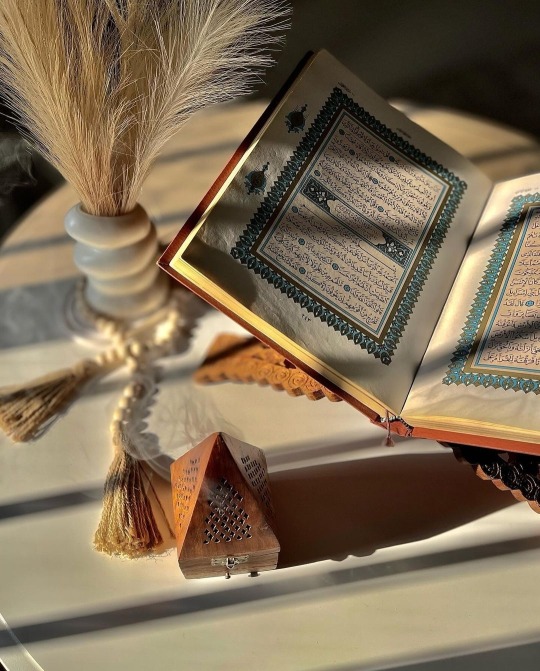
[Al-A'raf, 7:180]
127 notes
·
View notes
Photo

Verse of the day
آية اليوم
هُوَ اللَّهُ الْخَالِقُ الْبَارِئُ الْمُصَوِّرُ ۖ لَهُ الْأَسْمَاءُ الْحُسْنَىٰ ۚ يُسَبِّحُ لَهُ مَا فِي السَّمَاوَاتِ وَالْأَرْضِ ۖ وَهُوَ الْعَزِيزُ الْحَكِيمُ
سورة الحشر[24]
He is Allah: the Creator, the Inventor, the Shaper. He ˹alone˺ has the Most Beautiful Names. Whatever is in the heavens and the earth ˹constantly˺ glorifies Him. And He is the Almighty, All-Wise.
Surat Al-Hashr (The Exile)[24]
#Holy Quran#Quran#islam#allah#قران كريم#أدعية#أذكار#قران#muslim#السنة النبوية#الصلاة على النبي#الحرم النبوي#الرسول#السيرة النبوية#الصلاة على الرسول#اللهم صل على محمد وآل محمد#المسجد النبوي#صلوا على النبي محمدﷺ#أصدقاء تمبلر#تمبلر#تمبلريات#آل تمبلر#اقتباسات تمبلر#quotes#الحمدلله#تمبلر بالعربي#صداقة#صديق
30 notes
·
View notes
Note
📸 listen. listennnn i know eid is long past but!!! how about muslim!driver (or team member in general) celebrating eid with her team 🤭
(lowkey think that merc and williams would be the most inclusive when it comes to having a high-ranking muslim team member on their team, but i think mclaren is also up there probably?)
thank you so much for sending this!! i absolutely loved making it!
this was VERRYYY self indulgent (made driver a desi hijabi like me) and made me 🥹 i need more Muslim friends 😭😭
i added a post for chaand raat (the night of sighting the new moon, for my non-Muslim friends) because i got carried away with this prompt
also i made the driver be on merc to fill in that empty seat that’s currently there
yourusername
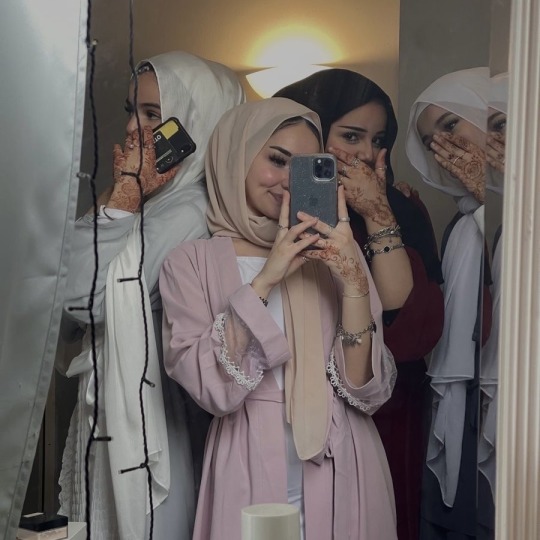

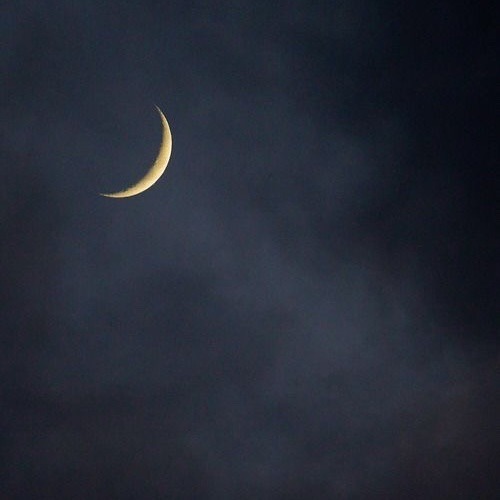
liked by georgerussell, mercedesamgf1, k_hussain, leilaabbas, and 35,476 others
yourusername chaand raat 🌙 🤍
(shout out khadijah for doing everyone’s henna)
tagged: @/k_hussain, @/leilaabbas, and @/its_zahra_ansari
load more comments…
k_hussain my hands hurt like CRAZY but anything for my girls 🫶🏽
↳ yourusername we love youuuu
↳ leilaabbas ditto!
↳ its_zahra_ansari ditto x2!! ❤️❤️
mercedesamgf1 chaand raat best raat!
↳ yourusername you know it!
georgerussell63 no invite for me 🥲
↳ yourusername lol sorry my chaand raat celebrations are for the girlies only
↳ georgerussell63 am i not one of your girlies
↳ yourusername no george, you are not
↳ georgerussell63 my heart is broken 😫😭
↳ yourusername you’ll get over it before race week 🙂↕️
yourusername
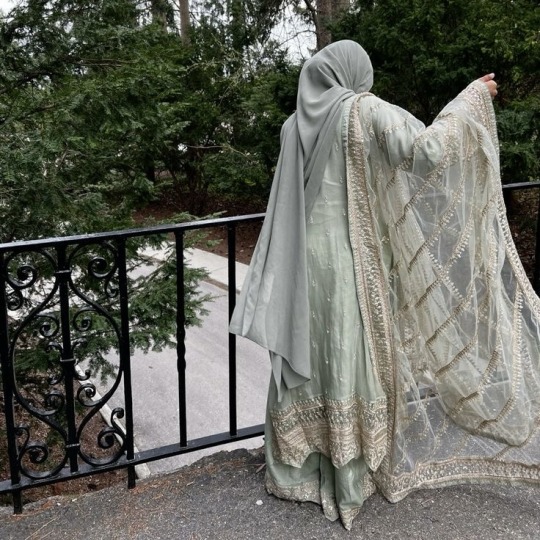

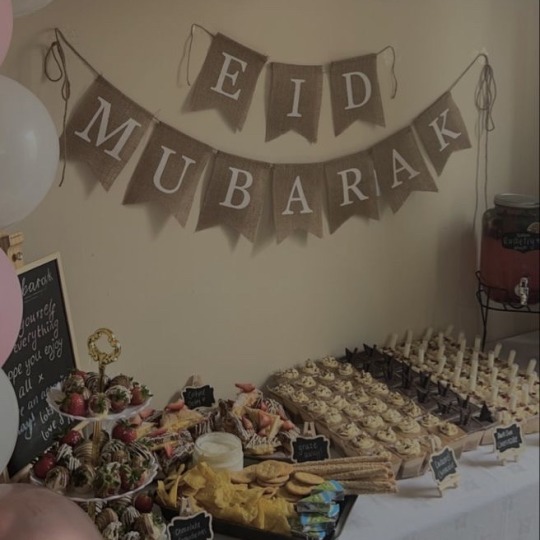
liked by georgerussell, mercedesamgf1, f1, its_zahra_ansari, and 41,386 others
yourusername Eid Mubarak!! May Allah SWT accept from you and us 🤍🤍
load more comments…
leilaabbas that outfit is gorgeous just like you! Eid Mubarak!
k_hussain Aameen Ya Rabb! Eid Mubarak 🫶🏽
mercedesamgf1 Eid Mubarak! Wishing you and your loved ones a very blessed Eid!
georgerussell63 Eid Mubarak to the best teammate ever!
↳ yourusername awe thank you georgie 🥰
its_zahra_ansari Eid Mubarak beautiful!!
its_zahra_ansari those cheesecakes look delicious i wonder who made them 🤔
↳ yourusername hm i think her name started with z and ended with ahra
georgerussell63 save a cheesecake for me?
↳ yourusername i’ll set some aside for you and toto!
↳ mercedesamgf1 Thank you, Y/N. Have a very good and happy Eid. -Toto
↳ yourusername thanks boss!
f1 Eid Mubarak Y/N!
all images from pinterest
Maleeha’s 300 Follower Celebration!!
23 notes
·
View notes
Note
(As an ex Muslim ) Liberal Muslims are like Rose from Get Out to me . Idk how to explain it . It's like the bully pretending to be kind. At least I know the deranged ones hate me .sorry for the weird rant ❤️
No it makes sense lol, yea a lot of liberal Muslims are genuinely nice people trying to live with an ugly religion. So instead of confronting the bad parts, they remain ignorant and find excuses, so they can maintain their niceness. And for most people, religion is like politics and not something critically thought about or engaged with, just on the back burner and used ritualistically for big life events like weddings or funerals. They are Muslim in name only, like most Christian’s and Jewish people, and are actually pretty agnostic with their beliefs…
But there’s another group of liberal Muslims I can’t stand, and it’s the ones that are very religious, that do engage with the faith a lot and have no excuses for pushing misinformation. They do dawah and actively spread lies to make Islam seem better, and then only when someone is in too deep do they reveal the ugly parts of the faith. They are just as misogynistic as the openly hostile ones are, but they use passive aggressive comments and arguments to get their way.
“You look so much more beautiful in the hijab habibti, just put it on! It’s so empowering to not be objectified. You’re a feminist right? Modesty is respecting a woman, don’t you know Islam gave women rights? 1400 years ago there was no hope for us, Islam actually made a lot of changes 🥺”
Riiiight, 1400 years ago they were worshipping hundreds of gods besides Allah, I guess he can make a hardline law and punishment about that, but not age of consent for even the “best of men” Muhammad 😒
18 notes
·
View notes
Text
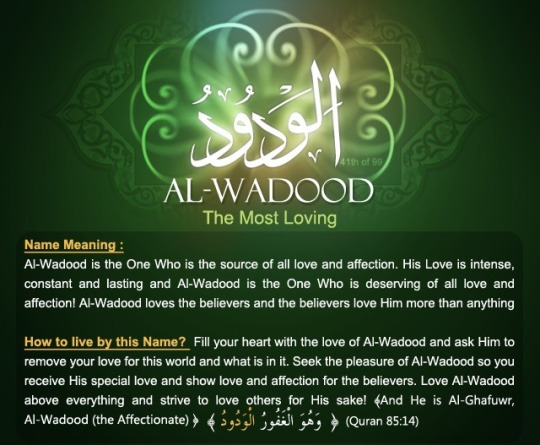
Allah calls Himself Al-Wadood— The Affectionate, The Most-Loving, The Beloved— twice in the Quran. Al-Wadood is the One who is the source of all affection, love, and kindness. Even though He does not need us in any way Al-Wadood wishes the best for us. He has a special form of love for His righteous servants who love Him because of their knowledge of His perfection and His readiness to forgive. Al-Wadood is the Affectionate and the Beloved!
The Most Loving, the Ever-Affectionate, and the Beloved
Wadood comes from the root waw-daal-daal, which carries three main meanings: to love, to be affectionate and to long, wish or desire for.
This root appears 29 times in the Quran in five derived forms. Examples of these forms are yawaddu (like, will wish), al mawaddata (the love), and wuddan (affection).
The concept of love in the Arabic language is decribed by different words, hubb and wudd are examples of them. Hubb is the inner-feeling of love for someone whereas Wudd is an intense, consistent affection as it is expressed in actions and conduct.
Wadood is from the fa’ool pattern which in Arabic grammar points to intensity and continuity. Allah is Al-Wadood; His love is intense, continuous and translates into the blessings, favours, mercy, guidance and forgiveness He gives to His slaves.
Al-Wadood Himself says: … Indeed, those who have believed and done righteous deeds, The Most Merciful will appoint for them affection. [Quran, 19:96] ..And ask forgiveness of your Lord and then repent to Him. Indeed, my Lord is Merciful and Affectionate. [Quran, 11:90] … And He is the Forgiving, the Affectionate[Quran, 85:14]
How Do We Gain the Love of Allah?
In a beautiful, comprehensive hadith you will find the formula on how to gain the love of Al-Wadood. The Prophet salallahu ‘alayhi wa sallam said: … And the most beloved thing with which My slave comes nearer to Me, is what I have enjoined upon him; and My slave keeps on coming closer to Me through performing voluntary acts of worship until I love him..Most beloved to Al-Wadood are you doing your obligatory acts of worship, then by doing your voluntary acts of worship you come closer and closer to Him.
Then what happens next? The Prophet continued about the amazing reward: …(so much so that) I become his hearing with which he hears, and his sight with which he sees, and his hand with which he strikes, and his leg with which he walks; and if he asks Me something, I will surely give him, and if he seeks My Protection (refuge), I will surely protect him. [Al-Bukharee]
Al-Wadood then becomes your special Helper, protecting your limbs and organs by not letting them work for anything He dislikes and a heart-melting seal: Al-Wadood will grant your wishes and keep you safe. Subhanallahi wa bihamdihi!
How Can We Live By This Name?
1. Have a close relationship with Al-Wadood.
Telling Al-Wadood about your concerns is a beautiful type of ‘ibaadah (worship) in itself. He wants you to turn to Him and tell him about your problems while remembering how close He is to you and how much you love Him. The mother of Maryam ‘alayha sallam said: ..My Lord, indeed I have pledged to You what is in my womb, consecrated [for Your service], so accept this from me. Indeed, You are the Hearing, the Knowing..[Quran, 3:35] This pious woman is a beautiful example of someone with a close relationship with Allah and Al-Wadood answered her dua’.
2. Love Al-Wadood above everything and anyone.
Al-Wadood says: Say, [O Muhammad], If your fathers, your sons, your brothers, your wives, your relatives, wealth which you have obtained, commerce wherein you fear decline, and dwellings with which you are pleased are more beloved to you than Allah and His Messenger and jihad in His cause, then wait until Allah executes His command. And Allah does not guide the defiantly disobedient people. This ayah is a great reminder pinpointing all the things we tend to love over Allah and His messenger.
3. Let your love be for the sake of Al-Wadood.
Ask yourself for what reasons you love people? Love people for the sake of Allah subhanahu wa ta’ala so Al-Wadood, His angels and the people of the earth love you! What an amazing deal. The Prophet sallallahu ’alayhi wa sallam said, When Allah loves a slave, calls out Jibril and says: `I love so-and-so; so love him’. Then Jibril loves him. After that he (Jibril) announces to the inhabitants of heavens that Allah loves so-and-so; so love him; and the inhabitants of the heavens (the angels) also love him and then make people on earth love him. [Al-Bukharee, Muslim] So mind who you love and love those who fear Allah, love Him and who strive for the good and forbid evil. This is the most beautiful kind of love you can have for another human being, even if you don’t know them.
4. Follow the Prophet salallahu ‘alayhi wa sallam.
Proof your love for Al-Wadood by sticking to the sunnah of His messenger. The reward: Allah will love and forgive you your sins. Another lucrative deal! Say: If you love Allah then follow me. Allah will love you and forgive you of your sins. And Allah is Oft-Forgiving, Most Merciful. [Quran, 3:31]
5. Love to recite Suratul Ikhlaas.
If you want Allah’s love, love talking about Him. Surah Al-Ikhlaas is one of the most comprehensive surahs describing Allah. The Prophet salallahu ‘alayhi wa sallam appointed a man in charge of an army unit who led them in prayer. He always concluded his recitation with Surah Al-Ikhlaas. Upon their return to Al-Madinah, they mentioned this to Messenger of Allah who said, “Ask him why he does so?” He was asked and he said, “This Surah contains the Attributes of Allah, the Gracious, and I love to recite it. Messenger of Allah then told them, “Tell him that Allah loves him”. [Al-Bukharee , Muslim]. So increase in reciting Surah Al-Ikhlaas with love!
6. Love for others what you love for yourself.
The Prophet salallahu ‘alayhi said: None of you will believe until you love for your brother what you love for yourself. [Al-Bukharee, Muslim] If someone just got married and you can’t find someone, someone got that new job and you didn’t, even though it might be hard, be happy for them. Strive to control your nafs (ego) and know it is Al-Wadood Who gives and takes. You will notice the peace it gives you inside when you love for others what you love for yourself, in stead of being jealous and anxious over others’ happiness. Live by this golden rule: treat others the way you want to be treated!
Wallahu ta’alaa ‘alem.O Allah, Al-Wadood, we know that You are the One Who is Most Affectionate. Make us of those who love You and Your Messenger above all, bless us with Your love and protection. Bring righteous people on our path and make us love them and them love us for Your sake only. Guide us in following the sunnah and in fulfilling our obligations towards You and give us the tawfeeq to perform many voluntary deeds of worship, ameen!
#allah#islam#revert help team#asma al husna#muslim#revert help#dua#daily#allah’s name#revert#religion#prayer#salah#muslimah#muhammad#how to convert islam#convert islam#new convert#convert#new reverth#how to convert to islam#hijjab#welcome to islam#help#convert help#islam help
10 notes
·
View notes
Text
Who is Allāh? ☝🏾
"He is Allāh - there is no god worthy of worship except Him: Knower of the seen and unseen. He is the Most Compassionate, Most Merciful.
He is Allāh - there is no god except Him: the King, the Most Holy, the All-Perfect, the Source of Serenity, the Watcher of all, the Almighty, the Supreme in Might, the Majestic. Glorified is Allah far above what they associate with Him in worship!
He is Allāh: the Creator, the Inventor, the Shaper. He alone has the Most Beautiful Names. Whatever is in the heavens and the earth constantly glorifies Him. And He is the Almighty, All-Wise."
[Sūrah al-Ḥashr, Verse 22-24]
18 notes
·
View notes
Note
What are the attributes of Allah?
The divine attributes are divided into two groups: personal and affirmative.
Personal Attributes:
1. Wujud (Existence),
2. Qidaam (Pre-eternity, eternal existence in the past),
3. Baqa (Eternity, immortality),
4. Wahdaniyyah (Oneness, having no partner),
5. Qiyam bi nafseehee (The continuation of His existence stems from nothing but Himself),
6. Mukhalafath-un lil hawadith (His essence does not resemble that of His servants and His attributes do not resemble those of His creatures)
Affirmative attributes:
1. Hayaat (Life)
2. Ilm (Knowledge)
3. Iraade (Will)
4. Kudrah (Power)
5. Sam (Hearing)
6. Basar (Sight)
7. Kalaam (Speech)
8. Takween (Creation, making).
As far as the attribute of takween(creation) is concerned, it is regarded as one of Allahs attributes according to the Maturidi school of thought. Another religious leader, Imam Ashari, does not regard this attribute as separate. Thus, there are seven affirmative attributes according to this school of thought.
It is possible to see that in some Islamic sources, the divine names are also considered attributes. For example, Kareem (All-Munificent) is one of Allahs names. At the same time, in terms of qualifying Allah munificent, it functions as an attribute as well. When we say "Allah the Munificent", we also use the name of Munificent as an attribute.
Again, in those sources, the attributes of Allah Almighty are evaluated in three groups:
1. Personal attributes
2. Actual attributes
3. Spiritual attributes
All of Allahs beautiful names rest on one of these attributes. For example, the name of All-Knowing rests on the attribute of "knowledge" from the affirmative attributes, the name ofPowerful on the attribute of "power", and the name of Speaker on the attribute of "speech". In the same way, the name of First rests on the attribute of qidaam (eternal in the past) from the personal attributes the name of Last rests on the attribute of immortality.
Most of the divine names rest on actual attributes. The name of Creator rests on the act of creation; the name of Life-Giver on the act of resuscitation; the name of Giver of Form on the act of shaping, the name of Giver of Death on the act of giving of death.
In addition, some names rest on the spiritual attributes. The name of All-Wise rests on the attribute of wisdom of Allah; the name of Most Great on the attribute of having grandeur; the name of All-Gracious rests on the attribute of beauty of Allah.
#allah#quran#revert#islam#muslim#help#reverthelp#prayer#god#muslimah#religion#dua#new muslim#new muslimah#new to islam#new revert#new convert#muslim revert#welcome to islam#how to convert to islam#hijab
8 notes
·
View notes
Text
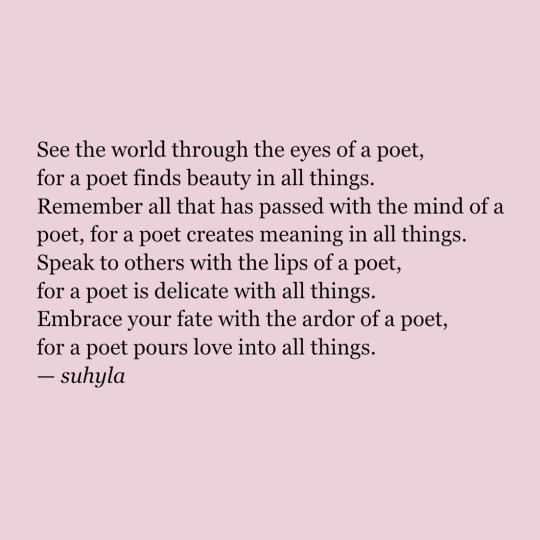
See the world through the eyes of a poet and suddenly, the smallest details become the most meaningful. You begin to appreciate the subtleties in every day life, all the things most people overlook. You feel the love and beauty of Allah in all things.
Close your eyes as you listen to the gentle rush of water from a stream. Reach your hand out and feel the water as it races to its destination. Lie down in the grass and feel your heartbeat slow as you watch the clouds move across the sky.
A poet melts in an atmosphere of warmth, and so devotes themselves in creating warmth everywhere they go. An atmosphere where vulnerabilities are embraced and happiness is in the most gentle gaze. A poet looks people in their eyes as they speak and uses their name often in conversation, for there is little more intimate than the sound of your name.
A soft touch suddenly has layers of meaning. Epics can be written about the eyes of another. The most vulnerable exchanges can happen in silence. Souls can so inexplicably be drawn to each other.
A poet pours all their love into all they do and receives the world with love. A poet smiles at the sky and feels Allah’s majesty in the sight of the sea. A poet finds comfort in the pages of history and sees themselves in the stories of philosophers, rebels, and kings. A poet bears the most courageous gleam in their eyes as they come across mountains their paths, knowing with certainty that stories will be told about how they make it to the other side.
See the world through the eyes of a poet. Love the world with the heart of a poet. Touch the souls of others with the fingers of a poet. Dip your words in gold with the care of a poet. Feel the pain of others with the chest of a poet. Free their chests from pain with the gentleness of a poet. Dress all that is within you in the grace of a poet. Turn your emotions into art with the brush of a poet. Endure all you go through with the perseverance of a poet. Hold your dreams close with the stubborn hope of a poet. Find beauty in all things✨
instagram
34 notes
·
View notes
Text
Tafsir Ibn Kathir: Surah al-Maryam Ayah 54-55
In the Name of Allah, the Most Gracious, the Most Merciful
19:54 And mention in the Book, Ismail. Verily, he was true to what he promised, and he was a
Messenger, (and) a Prophet.
19:55 And he would enjoin on his family and his people the Salah and the Zakah, and his Lord waspleased with him.
Mentioning Ismail
And mention in the Book, Ismail. Verily, he was true to what he promised. Here Allah has commended Ismail, the son of Ibrahim, the Friend of Allah. He (Ismail) is the father of all of the Arabs of the Hijaz because he was true to what he promised. Ibn Jurayj said, "He did not make any promise to his Lord, except that he fulfilled it.'' He never obligated himself to do any act of worship with a vow, except that he fulfilled it and carried it out, giving it its full due. Some said, ِ?he was) true to what he promised), "This was said about him because he said to his father,(If Allah wills you will find me of the patient), (37:102). So he was truthful in that.” Being true to one's promise is one of the praiseworthy
characteristics, just as breaking one's promise is of the detested characteristics. Allah, the Exalted, says, O you who believe! Why do you say that which you do not do! Most hateful it is with Allah that you say that which you do not do. (61:2-3)
The Messenger of Allah said, The sign of the hypocrite is three things.
• When he speaks, he lies;
• when he promises, he breaks his promise;
• when he is entrusted with something, he is
disloyal to his trust.
Thus, if these are the characteristics of the hypocrites, then behaving contrary to these is a characteristic of the true believer. For this reason, Allah commended His servant and Messenger Ismail, for he was true to his promise. Likewise, the Messenger of Allah was true to his promise.He did not promise anyone anything, except that he fulfilled his promise to that person. He also commended Abu Al-`As bin Ar-Rabi, the husband of his daughter
Zaynab, by saying, He spoke to me and he told me the truth, and he promised me and he fulfilled his promise to me. When the Prophet died, the Khalifah (his successor), Abu Bakr As-Siddiq said, "Whoever received any promise from the Messenger of Allah or was owed any debt by him, then let him come to me and I will fulfill it on his behalf.''
So Jabir bin Abdullah came and related that the Messenger of Allah said,
If the wealth of Bahrain comes (to me), then I would give you such and such and such.
This meant that he would fill his hands with wealth. Therefore, when the wealth of Bahrain came (to them), Abu Bakr commanded Jabir to come and fill his hands from that wealth. Then, he commanded him to do so again, until he collected five hundred Dirhams.
Then, Abu Bakr gave him its double along with it. (i.e. one thousand extra Dirhams).
Concerning Allah's statement, and he was a Messenger, (and) a Prophet.
In this is a proof of Ismail's favored status over his brother, Ishaq.Ishaq was only described as being a Prophet, but Ismail was described with both Prophethood and Messengership.
It is confirmed in Sahih Muslim that the Messenger of Allah said, Verily, Allah chose Ismail from the sons of Ibrahim...Then, Imam Muslim mentions the rest of the Hadith in its entirety.
However, this statement proves the correctness of what we have said. Allah said, And he would enjoin on his family and his people the Salah and the Zakah, and his Lord was pleased with him.
This is also a beautiful form of praise, a commendable quality, and and upright characteristic. He was commanded in this way because of his persistence in obedience of his Lord, and enjoining his family to do so. This is as Allah said to His Messenger, And enjoin the Salah on your family, and be patient with them. Also, Allah, the Exalted, said, O you who believe! Protect yourselves and your families against a Fire (Hell) whose fuel is men and stones, over which are (appointed) angels stern (and) severe, who disobey not, (from executing) the commands they receive from Allah, but do that which they are commanded. (66:6)
This means to command them to do good, forbid them from evil and do not neglect them. If you do so, and they obey your command, the Fire (of Hell) will not devour them on the Day of Resurrection. It has been reported in a Hadith from Abu Hurayrah that the Messenger of Allah said, May Allah have mercy upon a man who gets up at night to pray and he wakes his wife. If she refuses to get up, he sprinkles water in her face. May Allah have mercy upon a woman who gets up at night to pray and she wakes her husband. If he refuses to get up, she prinkles water in his face. This Hadith was recorded by Abu Dawud and Ibn Majah.
#Allah#god#islam#muslim#quran#revert#convert#convert islam#revert islam#reverthelp#revert help#revert help team#help#islamhelp#converthelp#prayer#salah#muslimah#reminder#dua#hijab#religion#muhammed#new muslim#new revert#new convert#how to convert to islam#convert to islam#welcome to islam
8 notes
·
View notes
Text

Art by Emma Whitehorse
* * * *
"No life is immune from suffering. When we’re in solidarity with people facing pain, injustice, war, oppression, colonization—the list goes on and on—we face immense pressure to despair, to become angry or dismissive. When reality is split dualistically between good and bad, right and wrong, we too are torn apart. Yet when we’re broken, we are most open to contemplation, or nondual thinking. We’re desperate to resolve our own terror, anger, and disillusionment, and so we allow ourselves to be led into the silence that holds everything together in wholeness.
"The contemplative, nondual mind is not saying, 'Everything is beautiful,' even when it’s not. However, we may come to 'Everything is still beautiful' by contemplatively facing the conflict between how reality is and how we wish it could be. We must face dualistic problems, name good and evil, and differentiate between right and wrong ... We can’t be naive ... , but if we stay focused on this duality, we’ll become unlovable, judgmental, dismissive people. I’ve witnessed this pattern in myself. We must eventually find a bigger field, a wider frame, which we call nondual thinking.
"Beginning with necessary, dualistic action and moving toward contemplation seems to be the ... path these days. We see this pattern in Dorothy Day, Martin Luther King Jr., and many others. Such people enter into the pain of society and have to go to God [the All, Source, Yahweh, Allah, use your wording] to find rest for their soul, because their souls are so torn by the broken, split nature of almost everything, including themselves.
"We need both action and contemplation to have a whole spiritual journey. It doesn’t matter which comes first; action may lead us to contemplation and contemplation may lead us to action. But finally, they need and feed each other."
~ Richard Rohr
(Natalie Sudman)
#Richard Rohr#Natalie sudman#quotes#dualistic action#pairs of opposites#nondual mind#contemplation#Natalie Sudman#Emily Whitehorse
12 notes
·
View notes
Text
A Sinner in Mecca

Director : Parvez Sharma
Producer : Parvez Sharma
Executive producer : Andrew Herwitz
Writers : Parvez Sharma, Sajid Akbar, Alison Amron
Senior editor : Parvez Sharma
Co-editor : Sajid Akbar, Alison Amron
Cinematography : Parvez Sharma, Husain Akbar
Casts : Parvez Sharma, Hamad al-Mutaani, Maram Alzghoul, Shady Eldanf, Ismail Sarsor, Ahmed Yagoub, etc
Genre : Documentary
Location : Saudi Arabia, USA, India
Year of Release : 2015
A Sinner in Mecca is a documentary film directed by Parvez Sharma. The film was co-produced by Haram Films, ZDF, Arte France Cinéma. The film chronicles Indian-born Parvez Sharma's Hajj pilgrimage to holy city Mecca (Makkah) as an openly gay Muslim.It's the first LGBTQ+ related film that was directed in Saudi Arabia.
The whole documentary is loaded with his personal quest as a homosexual Muslim seeking to reform the religion, that was hijacked by Islamists & Puritanical Muslims. The film is a beautiful examination of one's conflict between sexuality and spirituality. Sharma was well aware of how risky it is to direct a film on controversial topic, where both filming & homosexuality are banned.
A sinner in Mecca film offers non-muslim audience a warts-and-all view of the annual religious pilgrimage (hajj) to Mecca. The film also shed light on Sharma's past life. He also written a book by the same name in 2017.
Plot
Like all Muslims, Parvez Sharma dreamed of fulfilling his Hajj in the holy city of Mecca (Makkah). Unlike most other Muslims, he lives in a sense of suspension, an openly gay Muslim, regarded by many other Muslims as condemned by Islam to a perpetual state of sin. The label “sinner” in this film is also highly political, critical as it is of the ruling House of Saud - the current guardians of 2 holy sites in Islam, Makkah and Madinah.
In one of the early scene, we see Parvez Sharma marries his longtime American atheist boyfriend who is a New York-based musician. He is happily living with his husband in USA, which will likely be perceived as immoral and provocative by many conservative puritan muslims. In another scene, we get to know sharma's mother rejected him for being gay & it has impacted their relationship. He starts to revisit his coming to terms as a gay man and a Muslim.
He starts preparing for his pilgrimage to explore whether someone like him even has a place in the House of Allah. He visits Saudi Arabia in 2011, four months after Islamist Osama bin Laden was killed and seven months after the Arab Spring began. He records his entire journey on an iPhone and two suspended cameras. His footage of the Hajj is a mixture of stunningly beautiful shots from the thousands of pilgrims in a swirling mass around the Kaaba in the middle of the Al-Masjid Al-Haram to the hand held close-ups of the crass commercialism that lies barely 1,000 feet from Islam’s holy sites. It is where the sublime meets the squalid as streams of faithful move between the holy sites. He records his pilgrimage in constant fear of the “Mutaween”, the Saudi Sharia police. He's once again into the closet. The Mutaween police harassed him after finding out he's breaking local laws. He is not sure that he will finish his pilgrimage.
In Medina, where the Prophet Mohammad is buried, Sharma reflects, “Today’s Islam, which has been hijacked by a violent minority, would not be recognized by him.” He clearly shows the Saudi's destruction of its historical sites, since Wahhabism frowns on veneration of locations, as links to groups such as the self-proclaimed Islamic State Da’esh and its destruction of historic and holy sites in Iraq and Syria as part and parcel of the same destructive force that threatens to overwhelm the more moderate forms throughout the rest of the Muslim world with petrodollars and Saudi-funded mosques.
On his “hajj of defiance,” Sharma finds fellowship with Shia Muslims, who are outside the Orthodox Islam and unexpected solace in the confessions between perfect strangers such as Mohammed, who has come seeking forgiveness for his participation in an honor killing. Sharma falls when he circles the Kaaba, only to be helped up by the hands of unknown faithful, a sign, he too, will be forgiven.
Therefore, Sharma is able to come to reconcile his identity as a gay Muslim in one of the most moving sections of the film. When unable to complete his final act of the Hajj, sacrificing a goat to commemorate the sacrifice of Abraham in Saudi Arabia, he moves full circle to India, to complete the ritual, finding the spiritual peace he seeks.
8 notes
·
View notes
Text
اللَّهُ لَا إِلَٰهَ إِلَّا هُوَ ۖ لَهُ الْأَسْمَاءُ الْحُسْنَىٰ
Allah! there is no God but He! To Him belong the most Beautiful Names.
94 notes
·
View notes